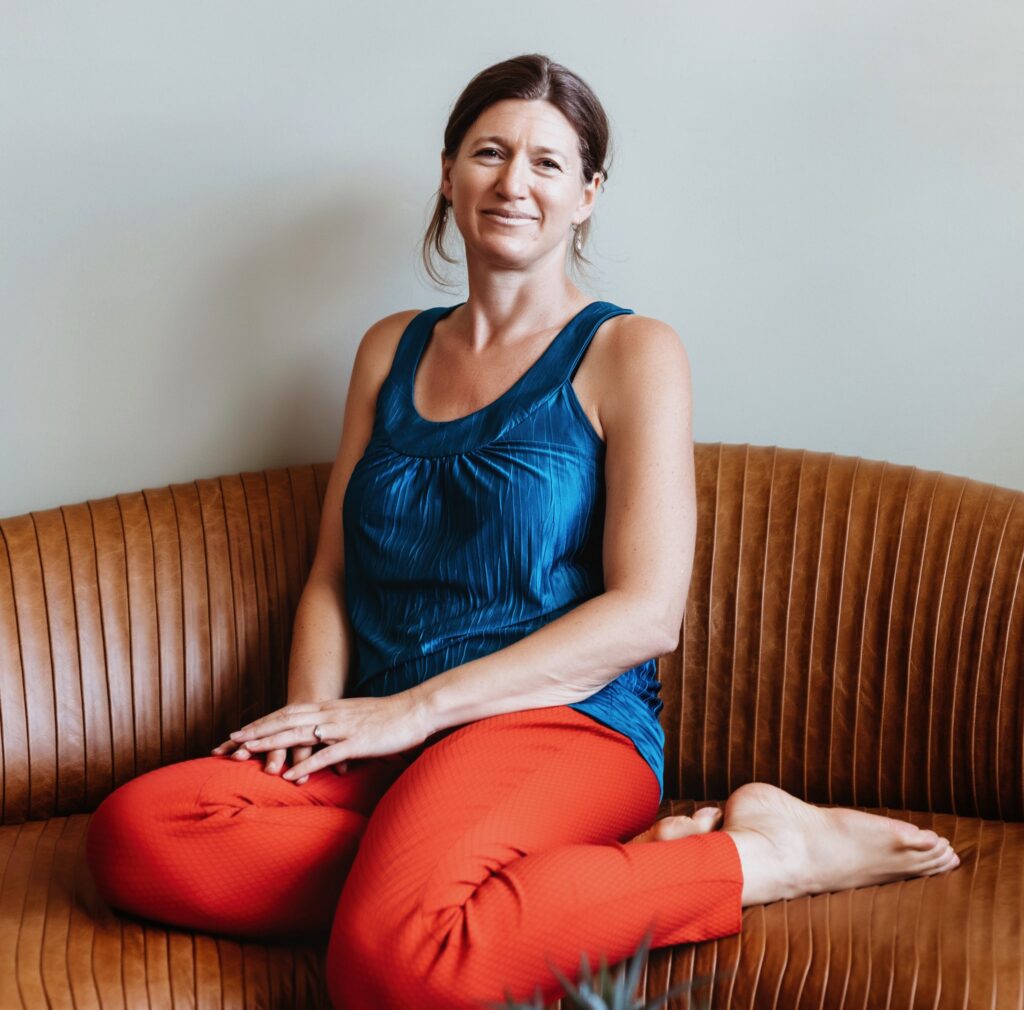
Yogic philosophy states that you are already whole and deeply connected to the world around you.
To engage in yoga does not make you more complete, rather the practice invites you to see past illusions and remove obstacles that prevent you from knowing your innate true nature.
The physical practice of yoga invites you to experiment with energizing movement and breath practices that are enlivening, empowering, playful, and strengthening. Ultimately, the aim of these practices is to cultivate a felt experience of equanimity as a counterpoint to the destabilizing impacts of stress and trauma. From this foundation, you can settle into stillness and allow yourself to be nourished by states of rest and relaxation.
The integration of Yoga and Internal Family Systems Therapy gives us tools for working with vulnerable emotions and sensations when they arise on the yoga mat. The conscious use of breath, mindful movement, and meditation help us to find our center, the place within that is untouched by the traumatic events of our lives. This act of centering brings us home to the Self and helps us to access a state of compassion and clarity—now we can attend to our wounds with wisdom.

“Centering” is a verb” ~ M.C. Richards
To reside at your center does not constitute a static state of being. Rather, centering represents your capacity to align with nature as it exists within and around you. Within the yogic tradition, the Sanskrit word, Spanda,refers to the pulsation of life that lives within us. Tuning into this rhythm allows you to notice how your emotions and mental states expand and contract. There may be days when you feel filled to the brim with excitement or creative inspiration. You might feel energetically and physically lighter. In contrast, all of us have days when we feel physically heavy, emotionally drained, or mentally fatigued. There is no bad or wrong state of being; rather, the goal is to adapt our breath and movement in a supportive manner that allows us to access the wisdom that resides within both the expansion and contraction.
Centering can be thought of as an ongoing process that allows you to access an inner source of peace, wisdom, strength. Centering allows you to know, that traumatic events inevitably will shape you, however, they are not all of who you are. Centering doesn’t mean that you ignore your distress but that you cultivate this resource so you can turn toward your distress without feeling swallowed by your pain.

Centering is closely related to what Richard Schwartz, developer of Internal Family Systems (IFS), refers to as connecting to the Self. The Self is a state of consciousness that exists within every person characterized by qualities represented by the 8 C’s:
Additionally, Self can be found in the 5 Ps:
As described by Sykes (2016), “In IFS, when we speak of the Self, we are referring to a centered stated of embodied self-awareness and self-acceptance, combined with a deep sense of how we connect to others.” (pg. 37).
In the IFS model, the Self is understood to be untouched and undamaged and as a result, this centered state of being invites you to access your own internal source of wisdom. You access the Self by finding a felt sense of your body in the here-and-now, cultivating a compassionate witness to our present-moment experience, or amplifying a connection to the heart through a sense of appreciation and gratitude.

All parts work therapies, including IFS, recognize that it is common to have different self-states that carry memories, sensations, beliefs, and emotions. The human mind is capable of conflicting thoughts, feelings, and needs and at times, competing needs can become polarized lead to feelings of anxiety, indecision, procrastination, or self-sabotaging behaviors. Sometimes, inner conflicts also manifest as somatic sensations of pain or symptoms of illness. Our parts tend to reflect our family of origin and we will carry within us the unresolved wounds from our past until we have an opportunity to revisit those events and find a new sense of repair and resolution.
Most importantly, all parts are essential to our wellbeing. As Richard Schwartz writes, there are no bad parts. Therapy involves befriending all of our parts and integrating emotions, sensations, or defense strategies held by parts into our overall sense of self. This is especially valuable when healing from trauma. When we integrate yoga and internal family systems therapy, we have ample opportunities to befriend parts of ourselves that carry our wounds. We learn to turn towards these emotions and sensations with compassion and self-acceptance. We can learn to attend to our vulnerable feeling within loving care.

Therapeutic Yoga provides you with a spiritual ground that supports the recognition of your own true nature; one that is fluid, responsive to your environment, and ever changing. Rather than denying the difficulties that you have faced, you can learn to turn toward them for the purpose of transformation. The practice of yoga can ultimately help you work through feelings of terror, rage, shame, and despair and to know that you can ultimately discover a greater sense of freedom, wisdom, strength, and peace.
We all have moments when we become clouded by self-doubt, fear, or faulty beliefs about our worth based on past wounds. These misalignments block access to our inner clarity. In these moments, we might feel as though we are being hijacked by a younger part of ourselves that is seeking our undivided attention. In order to heal, we must attend to these parts and treat each one like an honored guest who has an important message that needs to be heard. Ultimately, resolution requires that we listen to and take responsibility for each and every part of us.
The integration of yoga and internal family systems invites you to be curious. What does this part of you want you to know? What does this part need from you? From a space of acceptance and love, what would you like to say to this part of you?
This practice is devoted to the theme of centering.
Most importantly, I this is an intentional and attentional practice that invites you to turn your awareness to the internal experience of your Self… When our awareness is focused on the outer world for extended periods of time…we can start to feel fatigued, it depletes our resources. The antidote is to nourish your body and mind by turning the lens of your attention inside…This is pratyahara:
From my book, Therapeutic Yoga for Trauma Recovery: “From a yogic perspective, you can think of this process as directing your life-force energy toward yourself. Ideally, this provides a respite from the outer world and is a way to nourish yourself with self-awareness.” Dr. Arielle Schwartz

Arielle Schwartz, PhD, is a psychologist, internationally sought-out teacher, yoga instructor, and leading voice in the healing of PTSD and complex trauma. She is the author of five books, including The Complex PTSD Workbook, EMDR Therapy and Somatic Psychology, and The Post Traumatic Growth Guidebook.
Dr. Schwartz is an accomplished teacher who guides therapists in the application of EMDR, somatic psychology, parts work therapy, and mindfulness-based interventions for the treatment of trauma and complex PTSD. She guides you through a personal journey of healing in her Sounds True audio program, Trauma Recovery.
She has a depth of understanding, passion, kindness, compassion, joy, and a succinct way of speaking about very complex topics. She is the founder of the Center for Resilience Informed Therapy in Boulder, Colorado where she maintains a private practice providing psychotherapy, supervision, and consultation. Dr. Schwartz believes that that the journey of trauma recovery is an awakening of the spiritual heart.

Arielle Schwartz, PhD, is a psychologist, internationally sought-out teacher, yoga instructor, and leading voice in the healing of PTSD and complex trauma. She is the author of five books, including The Complex PTSD Workbook, EMDR Therapy and Somatic Psychology, and The Post Traumatic Growth Guidebook.
Dr. Schwartz is an accomplished teacher who guides therapists in the application of EMDR, somatic psychology, parts work therapy, and mindfulness-based interventions for the treatment of trauma and complex PTSD. She guides you through a personal journey of healing in her Sounds True audio program, Trauma Recovery.
She has a depth of understanding, passion, kindness, compassion, joy, and a succinct way of speaking about very complex topics. She is the founder of the Center for Resilience Informed Therapy in Boulder, Colorado where she maintains a private practice providing psychotherapy, supervision, and consultation. Dr. Schwartz believes that that the journey of trauma recovery is an awakening of the spiritual heart.